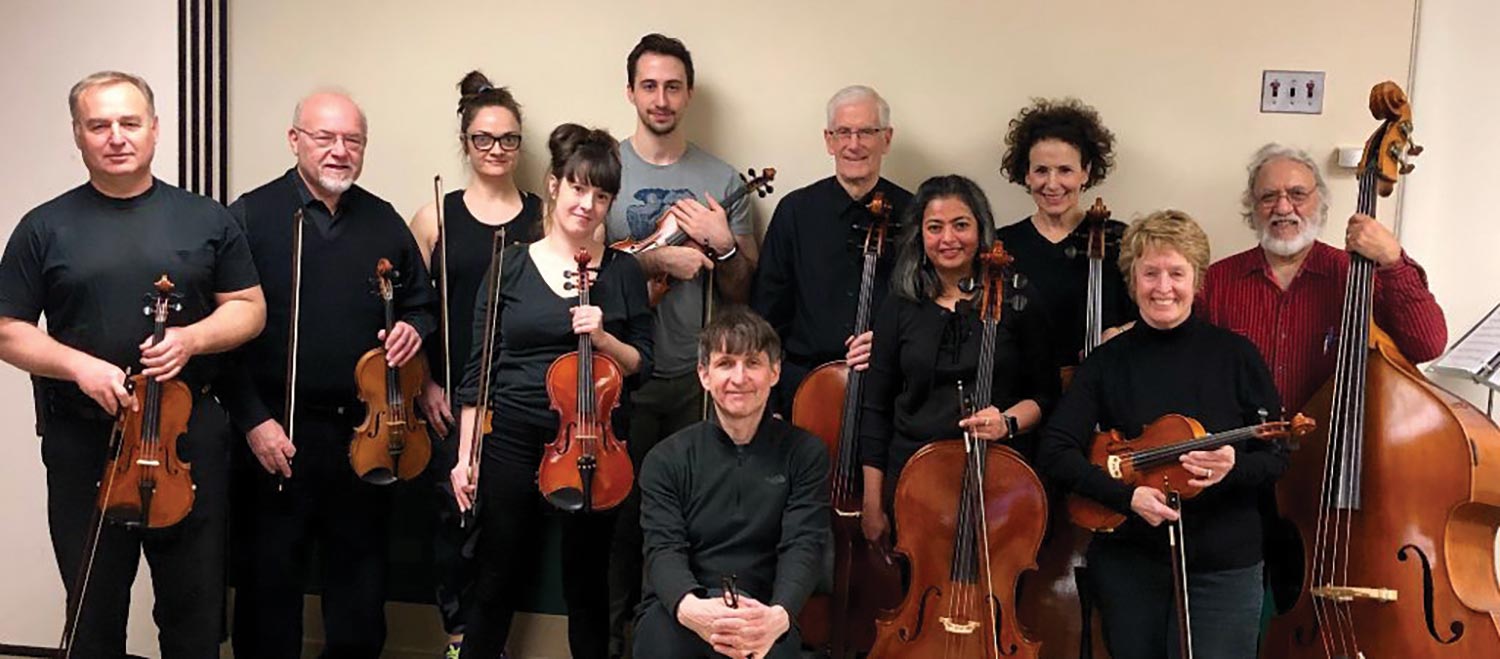This is Us
Hartford HealthCare might be where we work, but when we asked you where you find fun, relaxation or deeper meaning in your lives, we were astonished at the variety of hobbies and activities you pursue in your spare time. Here are a few of those stories, and we’ll have more in upcoming issues of Moments. To share your hobby, email susan.mcdonald@hhchealth.org.
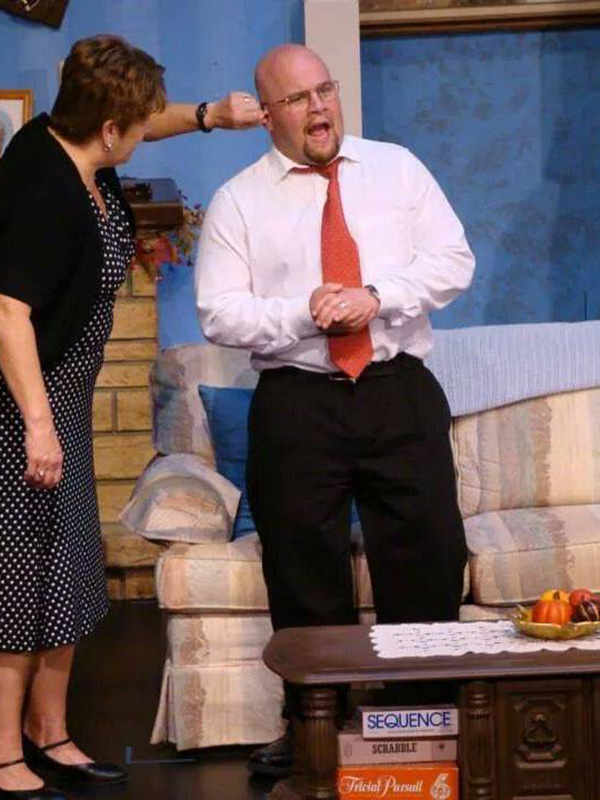
Bone & Joint Institute sterilization technician Jason Mullis appears in action during a production of “A Nice Family Gathering” at the Windham Theatre Guild.
Acting Allows BJI Tech to be Someone Else — Even a Villain! (Cue Evil Laughter)
Jason Mullis, Sterilization technician, Bone & Joint Institute
By day, 33-year-old Jason Mullis ensures that all instruments headed for the Bone & Joint Institute operating rooms are clean and sterile. A sterilization technician, his job revolves around the little details that make an OR ready for patients. By night (pre-COVID, at least), he steps into character and becomes someone else, under the lights at the Windham Theatre Guild in Willimantic.
How did you get into acting?
In high school, I would act up sometimes and a teacher suggested I take my rambunctious energy and put it toward the school play. I was always trying to express myself creatively and since I was not good at art or music, this was a positive outlet. I knew since first stepping onto that stage that this was right for me.
What is the Windham Theatre Guild?
How long have you been with them? It is a community theater group in my hometown of Willimantic. They have been part of the city for more than 30 years and have gained a wonderful reputation. I have been acting with them since 2013, and I consider that my stage home, though I have also done shows for the Little Theatre in Manchester.
How did the pandemic affect the organization?
As one might suspect, in theater you need to be in close proximity to other actors and sometimes even share an act of physical intimacy like a kiss, so theater during the pandemic was shut down for pretty much everyone everywhere, even Broadway. I know some local theaters tried to put on productions via Zoom and others had performances where the actors were socially distanced with an online audience viewing. But, they lacked a certain authenticity to me.
What is your favorite type of role?
Playing a villain is an all-time favorite just because of the fun you can have with the character, depending on the play. When building these characters, you can give them certain traits or nuances that can add to their wickedness. And, getting the right reaction is key, too. You want to make it someone the audience loves to hate.
What is your favorite play?
A favorite play I starred in was the stage adaptation of “One Flew Over The Cuckoo’s Nest” played Cheswick. My favorite play of all time is “Little Shop of Horrors” because who doesn’t love a singing, people-eating plant from outer space? Plus the songs are great!
What is your favorite piece of dialogue?
It may sound cliché, but really anything by Shakespeare because there is hidden symbolism in much of his writing. Specifically, the Queen Mab monologue from “Romeo and Juliet.” It’s basically Mercutio making fun of Romeo about his long-winded speeches by giving him a longwinded speech.
What is coming up for you?
I’m on a bit of a happy hiatus since my daughter was born in 2019. At the moment, I have nothing planned for the immediate future, but I know the stage will always be there waiting for me to return. And, I promise I will return (cue evil laughter)!
—Elissa Bass
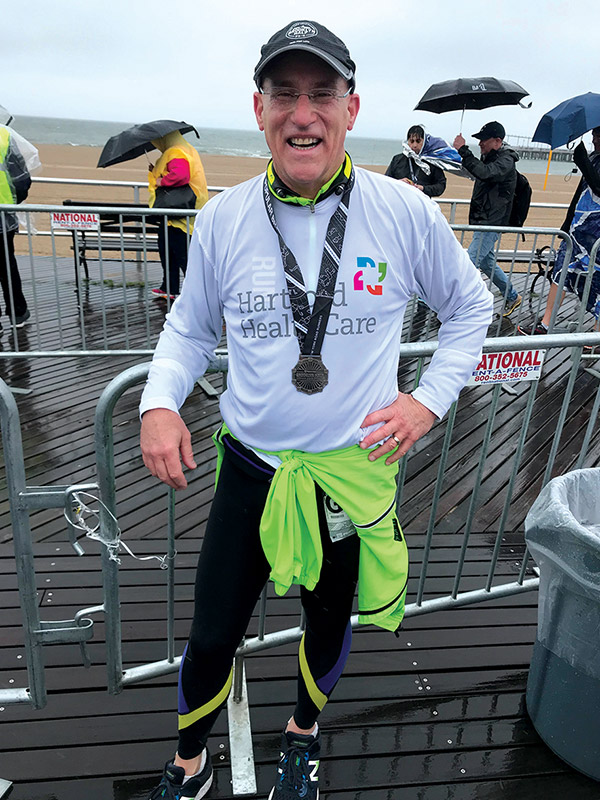
Dr. Jeffrey Cohen pauses after completing the Brooklyn Half Marathon.
Marathoner Keeps Eyes Trained on the Finish Line
Dr. Jeffrey Cohen, Chief Clinical Operating Officer, Hartford HealthCare
Dr. Jeffrey Cohen spends a lot of time running around. As Hartford HealthCare’s chief clinical operating officer, he works to enhance clinical integration and operation efficiencies from Fairfield to Westerly. When not running (or driving) around the state, he can be found hitting the pavement for marathon training.
When did you start running competitively?
I ran in college and medical school, but didn’t take it seriously until my late 30s. One day, I was watching the NYC marathon on TV. There is a key part of the race where the runners descend off the Queensborough Bridge and step foot in Manhattan for the first time. The next year, I trained and got into the 1997 NYC marathon.
In what kind of events do you take part?
While I ran 5- and 10K races as I trained for my first marathon, my enjoyment comes from competing in and completing longer races. Once I started running marathons, I would intersperse them with half marathons, for training purposes as well as the feeling that even that distance was an achievement I could celebrate.
What is your training regime like?
I should point out that my reason for running long distances is so that, within reason, I can eat anything I want. Burning that many calories gives me latitude to not have to count calories I consume. However, I do try to eat healthy as much as possible. When actively training, I run four to five days a week, which is all my work schedule allows for since I was never great at running in the early morning. One of our purchases during the pandemic was a Peleton bike so I am looking forward to engaging that more frequently in the colder months when I tend to run less.
Do you run with friends or family?
I will run most often with my wife. Our springer spaniel accompanies me on shorter runs. Once in a while, I can draft one of my four daughters to go with me.
In how many races have you competed?
Not sure of the exact number, but I do remember all 10 marathons, including four Hartford marathons and four NYC marathons.
What is your greatest accomplishment as a runner?
Crossing the finish line in my first marathon in 1997. I developed severe leg pain about two-thirds through the race, which I pushed through. I also have wonderful memories of the marathons where my wife joined me to cross the finish line together.
How do you overcome injuries?
I have incurred numerous nagging injuries over the years, most of which were short-lived and easy to deal with. My best advice is to listen to your body and not try to run through the injury just to stay on your training schedule. I have had to postpone a couple of races because I didn’t take my own advice.
Do you have future races planned?
I am planning to run a couple of half marathons. My main goal is the Brooklyn Half Marathon, cancelled twice during the pandemic, next spring. The last time I ran it was in a cold rain, and I want to run it again as it courses past a number of areas where my parents, grandparents and great-grandparents were born and raised.
—Emily Perkins
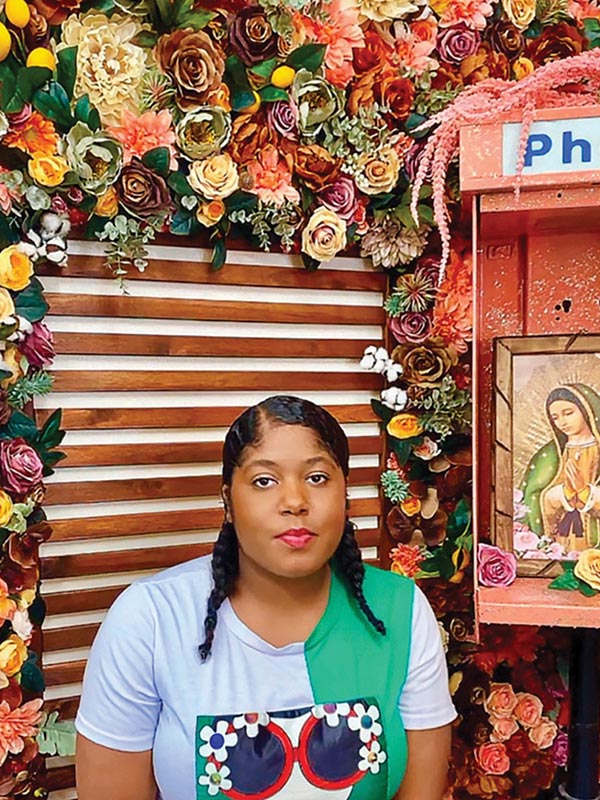
Caela Collins recently published a book of poetry.
Author Finds Inspiration in Life, Family Recipes
Caela Collins, Administrative associate, Hartford HealthCare at Home
We met Caela Collins in June 2021, when Congress declared Juneteenth a federal holiday commemorating the emancipation of African- American slaves. She shared a poem she had been commissioned to write for this year’s observance.
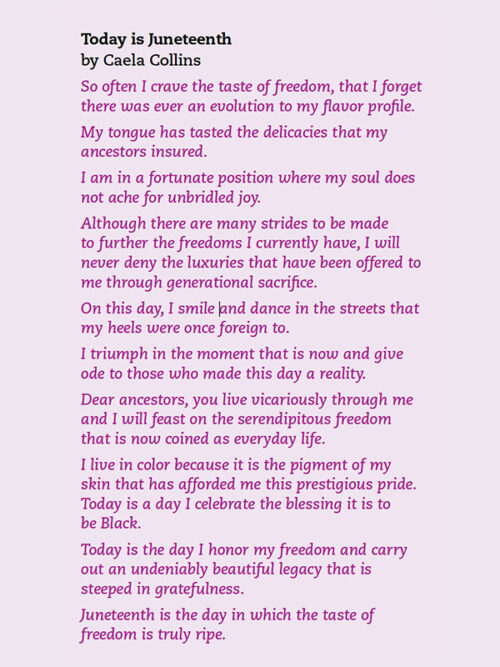
Your poem is powerful. You have also written a children’s book. Tell us about your book. Food is Love is about a young girl, her grandmother and the importance of cooking and keeping family traditions alive, something every family of any cultural background can relate to. The main character, Catori (a Native American name/word that means spirit) is a 6-year-old girl with a vivid imagination. When her grandmother dies, she takes a magical journey through the history of food and discovers that fond memories and family recipes will keep her grandma’s spirit alive in her heart forever.
How did you end up writing a children’s book?
I never in a million years ever thought I’d be a writer. In school, I studied business management and studio art. When I took an editorial internship to fill up space in my college schedule, I realized the power of my voice. Because people really liked what I had to say and connected with my perspective, I decided to write more.
Did you illustrate the book as well?
I studied art in college, but I did not illustrate the book. It was important for the illustrations to be highly artistic so I oversaw the art direction. I also wanted to give the opportunity to a young, hungry artist. I put out an open call for artists. I chose an art student from Korea named Jeongin (Jen) Yoon. I’m very proud of how our artistic styles collided for the book.
Where can we find Food is Love?
Food is Love is sold on Amazon and Barnes & Noble (online only). It’s also available at the Hamden Public Library and on the app Novel Effect. My dad is a railroad conductor and he talks about my book on the train. I’ve received letters from people who’ve said that they cried after reading it.
What’s next?
In the story, Catori and her grandmother use what they call a “scrookbook” (scrapbook/cookbook) to save their recipes and add pictures and stickers to remember their creations. I’m adding a mini activity booklet designed by another great artist, Kimberly (Kim) Balacuit, so kids can make their own scrookbook in a special edition of Food is Love that I’m currently working on. It will have a new cover and keto, gluten-free, vegetarian, vegan and meat lover recipes for the whole family, curated by culinary nutritionist Frankie Douglas. I’m also expanding the story as a chapter book series. Catori has so many more adventures in her as she gets older!
—Hilary Waldman
Doctors Working in Concert – Cue, Maestro!
Dr. Karen Blank Psychiatrist and department consultant, Institute of Living
Doctors from around Connecticut meet regularly but it’s not patients they discuss, it’s music. The Connecticut Doctors’ Orchestra (CDO), co-founded by Dr. Karen Blank, a psychiatrist and department consultant at the Institute of Living, are string musicians with a shared appreciation for music who raise awareness and funds for various causes through performances.
How did the orchestra come about?
My friend, Dr. Latha Dulipsingh, and I met at the University of Hartford’s Hartt School of Music where our children were taking music lessons and playing in children’s orchestras. We soon started cello study; I was pleased to find it’s never too late as I started at age 50! Several years into our studies, Dr. Dulipsingh returned from a trip to England where she met a member of a doctors’ orchestra at Oxford University. She suggested we start one here. We had been looking for an opportunity to get together like-minded musicians, arranging excellent musical direction and sharing our love of music with the community through fundraising concerts for medically-related causes.What’s it like to collaborate with health professionals from around the state? During our 13 years together, one of great pleasures of being in CDO has been to play with musicians who work in a variety of healthcare settings in and outside of HHC. It has been a rare experience to get to know professionals from HHC, Trinity Health, UConn, the New Britain Department of Health, St. Mary’s, private practices, and professors in related fields. It has also been remarkable to see relationships develop between healthcare professionals at the widest spectrum of experience from medical students and residents to senior physicians, all united around our shared love of music. Our musicians have musical backgrounds along a wide spectrum from advanced conservatory training to intermediate Suzuki method students. We all benefit from ongoing, wonderful collaborations between extraordinary musicians from the Hartford Symphony Orchestra.
How many people make up the orchestra and what are some of their professional specialties?
We hover between 14 and 15 string players, and are always interested in welcoming more. We have worked with approximately 25 musicians over the years. Dr. Dulipsingh is an endocrinologist for St. Francis and regional physician executive for medical specialties for Trinity Health. Members’ subspecialties include neurosurgery, psychiatry, infectious disease, endocrinology, orthopedics, internal medicine, pediatrics as well as professors of chemistry, sociology, women’s studies and family and couple therapy.
—Brenda Kestenbaum

